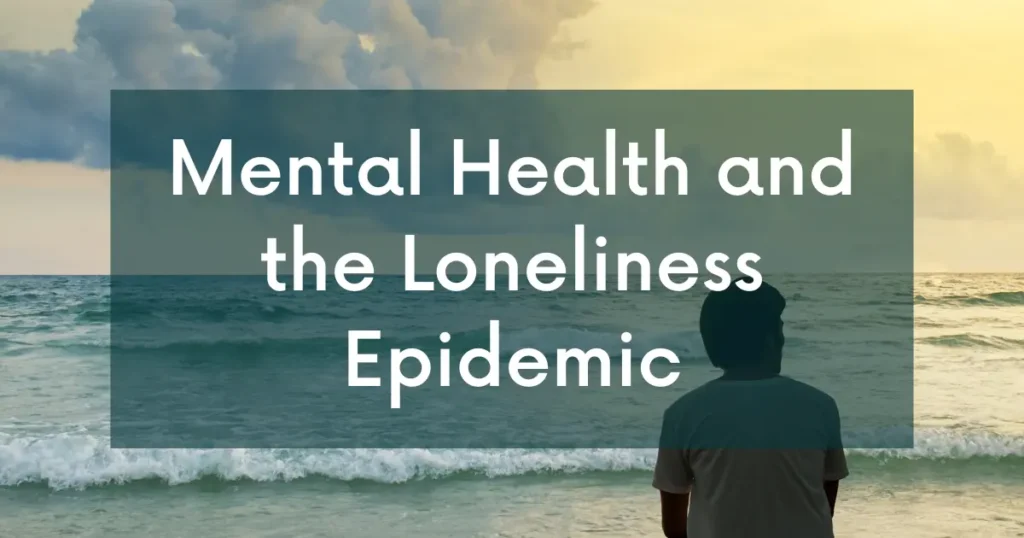
Mental Health and the Loneliness Epidemic
Mental Health and the Loneliness Epidemic: How Isolation is Impacting Well Being—and What We Can Do About It
What Is the Loneliness Epidemic?
The U.S. Surgeon General, Dr. Vivek Murthy, has called loneliness an “epidemic,” one that carries risks to health as serious as smoking or obesity. According to a 2023 advisory from the U.S. Department of Health and Human Services, nearly half of U.S. adults report experiencing measurable levels of loneliness, even before the pandemic intensified the issue.
Loneliness vs. Social Isolation
It’s important to distinguish between loneliness and social isolation.
- Social isolation is the objective lack of social contact or interaction.
- Loneliness is the subjective experience of feeling alone or disconnected, even if one is surrounded by others.
You can be socially connected and still feel lonely. Conversely, some individuals who live alone may feel deeply connected to others.
What’s Driving It? Modern Causes of Loneliness
A mix of cultural, technological, and demographic shifts have contributed to rising levels of disconnection. Among the most common drivers:
Remote Work and Digital Lifestyles
The shift to remote work has brought flexibility, but also reduced daily human interaction. Many people spend most of their waking hours in front of screens, communicating through email and messaging apps rather than face-to-face.
Post-COVID Behavior Shifts
Pandemic-era restrictions intensified feelings of loneliness, especially among those living alone or without strong local social ties. Though life has largely returned to normal, many people still struggle to reconnect socially or feel safe engaging in group settings.
Decline in Community and Faith-Based Spaces
Participation in community organizations, religious services, & volunteer groups declined over the last two decades, leaving fewer spaces for social connection.
Aging, Caregiving, and the Erosion of Traditional Support Systems
As we age, we naturally lose peers, partners, or caregivers. Many older adults, especially those without family nearby, face profound isolation. At the same time, younger caregivers can also feel isolated in their roles, lacking support and emotional connection.
The Evidence: How Loneliness Impacts Mental Health
The health risks of chronic loneliness are well-documented and significant.
Key Findings:
- Lonely individuals are 2–3 times more likely to experience depression, according to research published in The Lancet Psychiatry.
- The CDC and NIH report that the health risks of loneliness are comparable to smoking 15 cigarettes per day.
- Loneliness is linked to higher risks of dementia, heart disease, stroke, and even early death (CDC, 2023).
The Emotional Toll:
Chronic loneliness activates the brain’s stress centers. People may become hypervigilant, interpreting neutral social cues as negative. This can lead to:
- Rumination and negative thought loops
- Social withdrawal and avoidance
- Increased self-criticism and poor self-esteem
These effects often worsen existing mental health conditions, such as depression, trauma, or anxiety, creating a painful feedback loop that’s difficult to break alone.
How Amend Treatment Helps Clients Facing Loneliness
At Amend Treatment, we understand that loneliness is not just a feeling—it’s a risk factor, a symptom, and sometimes a root cause. That’s why our approach to healing is deeply relational and individualized.
Relational Healing Model
Our clinicians emphasize building strong therapeutic alliances, focusing on genuine connection rather than just symptom management. Trust, presence, and deep listening are foundational to our care.
Group-Integrated Programming
Daily process groups, experiential therapy, community meals, and shared wellness activities help Clients connect meaningfully with others in a supportive, emotionally safe environment.
Tailored Treatment Plans
Whether loneliness is contributing to depression, grief, or life transition challenges, our team develops customized plans to address both the underlying causes and consequences of isolation.
Healing Environment in Malibu
Our natural, ocean-adjacent setting creates space for reconnection with self and others. Time in nature, away from digital distractions, helps foster clarity and authentic presence.
If you or someone you love is struggling with the emotional toll of loneliness, know that support is available, and healing is possible.
Contact Amend Treatment to learn more about our relational approach to care and how we help people reconnect, with themselves and with others.
Frequently Asked Questions
Is loneliness a mental health disorder?
No. Loneliness is not a clinical diagnosis, but it is a serious health concern that can contribute to or worsen mental health disorders like depression and anxiety.
How do I know if loneliness is affecting my mental health?
If you’re feeling persistently sad, disconnected, unmotivated, or anxious, and those feelings don’t improve with social contact, it may be time to seek help. Loneliness is valid and deserves care, just like any other mental health issue.
Does residential treatment help with loneliness?
Yes. Residential care provides a unique environment for relational healing, structured community interaction, and time away from isolating routines. For many, it’s the first time in years they feel truly seen and supported.
